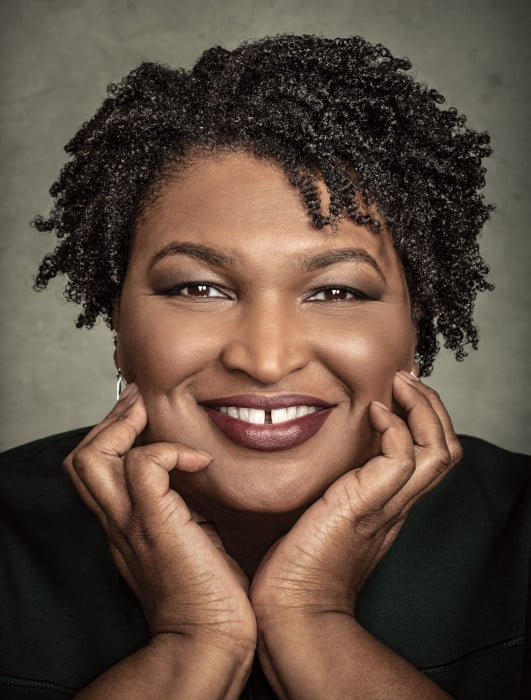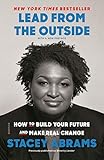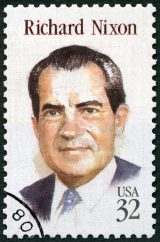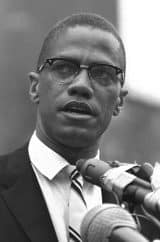 Waiting in the Wings
Waiting in the Wings
Unlike most politicians, Stacey Abrams doesn’t chase headlines like a seagull eyeing a dropped French fry. She wants supporters, sure, but doesn’t try to make disciples of them. She’s not afraid of rocking the boat, but she’s scrupulous in doing so within the rules – like the time when, as a student, she burned a Confederate flag, but only after securing a permit to do so.
In a political environment dominated by tweets, partisan commentators, and outright mudslinging, she offers something that’s increasingly lacking: substance. Her erudite brand of common sense and understanding of what truly matters make her almost unique in American politics, as well as someone to watch in the years to come.
Ideals and Pragmatism: A Balancing Act
Stacey Abrams’ best non-fiction books prove that she knows exactly what she stands for. More importantly, she can clearly articulate why she believes as she does. One does not get the impression that her positions are the result of market research or prompting by her party.
Her devotion to principles and integrity even shines through in her fiction. This includes Stacey Abrams’ latest book, Stacey’s Extraordinary Words, which teaches children the value of perseverance, literacy, and being heard. In case you’d like to get to know this remarkable woman a little better, here are the top five Stacey Abrams books ranked by popularity:
Best Stacey Abrams Books
| Photo | Title | Rating | Length | Buy |
|---|---|---|---|---|

|
Our Time Is Now | 9.98/10 | 322 Pages | Check Price On Amazon |

|
The Avery Keene Series | 9.82/10 | 256 Pages | Check Price On Amazon |

|
Lead from the Outside | 9.72/10 | 2 Books | Check Price On Amazon |

|
Hidden Sins | 9.46/10 | 381 Pages | Check Price On Amazon |

|
Level Up | 9.34/10 | 238 Pages | Check Price On Amazon |
Our Time Is Now

 An Uphill Battle
An Uphill Battle
Many Americans don’t realize that our right to vote doesn’t spring from the Bill of Rights nor even, for most of us, the Constitution. Instead, the idea of universal suffrage, however obvious and natural it may seem today, required no fewer than four separate amendments to implement (the 15th, 19th, 24th, and 26th, in case you want to look them up).
The first of these was ratified in 1870, almost five years after the conclusion of the Civil War. The last, which lowered the voting age to 18, only came into force in 1971. Each one of these amendments was the result of a significant political and legislative battle, not a matter of crossing and dotting some Ts and Is. In Our Time Is Now, her second non-fiction work and one of the best Stacey Abrams books, she asks the question: are we done?
Imperfect Democracy
The ancient Greek city of Athens is often held up as the first example of a democratic state. This is a little glib, though: something people like to forget to mention is that only about 10% of residents were actually allowed to vote.
The situation in modern-day America is not that bad, of course. “Bu it’s not a total catastrophe” is not really the point of the top Stacey Abrams books, though, at least not when important issues are at stake. The legitimacy of elected leaders rests entirely on the basis that elections are truly free and fair. If their integrity can’t be verified – or, as Abrams insists, meaningful public discourse on the topic is sidelined – the people in the fancy offices have no business representing a community or even a nation.
The Butterfly Effect
Candidates are often appointed based on a lead of only a fraction of a percent, especially in swing states like Florida (remember Gore vs Bush. 2000?) and Abrams’ birth state, Wisconsin. This means that even a marginal amount of voter suppression can have major effects if it is targeted at some recognizable group more likely to vote for one party over the other. At best, Stacey Abrams argues in her books, this happens some of the time. In fact, it happened to her when she tried to vote for herself in the 2018 Georgia gubernatorial election!
Even worse, the mere appearance of unfairness can discourage eligible citizens from voting, as about half of them do in America. It also opens the door to the losers alleging vote fraud even without any basis, diminishing the value of elections in favor of legal proceedings in which ordinary citizens have no say.
A Clear Plan of Action
Teddy Roosevelt once said: “Complaining about a problem without posing a solution is called whining.” Luckily, the best-selling Stacey Abrams books aren’t built around self-pity. One part of Our Time Is Now is a discussion of the points above, only with much greater eloquence and supported by a large body of credible research.
More importantly, this Stacey Abrams book lists practical steps we – all of us – should take towards fixing this problem. One thing is sure: simply sweeping voter suppression under the rug as “administrative errors” or “cost-saving measures” is not the answer. Any time the electoral system is weakened and discredited, the distance between the people and the politicians grows a little bit.
The Avery Keene Series
 A Woman of Many Talents
A Woman of Many Talents
Apparently, whenever Stacey Abrams isn’t practicing law, running a company or founding a new one, spending time on her numerous non-profit organizations, or doing whatever a politician who’s temporarily out of office does, she writes novels.
It’s not really surprising that so many lawyers end up becoming either writers or politicians. All three of these professions require some skillfulness with the written word, the willingness to do hours upon hours of research, and the ability to see multiple points of view. As far as I know, though, Abrams and John Grisham are the only Americans who’ve been successful at all three. The most popular Stacey Abrams books are easily in the same league as Grisham’s work.
Complex, Fast-Paced Thrillers
Reading While Justice Sleeps feels a little like sprinting through an obstacle course. The reader has to absorb some fairly complex legal and political concepts, which are definitely drawn from real-world experience, more or less on the fly. The action is also non-stop, and rarely predictable.
Rogue Justice, Stacey Abrams’ new book, also touches on political conspiracies with tentacles reaching into the United States’ highest courts. The hero from the first novel, Avery Keene, is still a mere law clerk, a relatively insignificant role in the legal system but also one that typically leads to greater opportunities later on (can anyone say “sequel”?). Again, she’s pulled into the affairs of high-ranking judges when she notices something shady going on.
Food for Thought
Some Stacey Abrams book reviews (she uses the pseudonym Selena Montgomery for romance novels) have compared her politico-legal thrillers to those of Dan Brown. This makes sense in terms of their pacing and scope – those 400-odd pages seem to just fly by – but that’s really where all comparison stops.
Dan Brown is an entertainer. He writes books that can be easily digested even when read in 15-minute chunks. There’s nothing wrong with that, but it also means that he has to or prefers to use characters with no greater or depth than emojis. His dialogue is often stilted. He’s also occasionally guilty of using deux ex machina: plot twists that nobody can see coming precisely because they’re utterly unlikely to ever happen.
Set in a Real World Most of Us Never See
You wouldn’t exactly read Stacey Abrams’ fictional books in order to understand the workings of law, government, and high finance. Each aspect of the book is meticulously researched and honestly presented, though. Readers who happen to have some experience with what she talks about are unlikely to find major inaccuracies to frown at.
Events in the Avery Keene series are rarely humdrum, but also entirely plausible. It makes you wonder what may be going on in the corridors of power, possibly including events which we’ll never hear about on the news. If these books have a flaw, it’s that their plots are actually too complex. A reliable sign of this is when you see characters explaining to you what’s been happening, instead of letting you figure it out by yourself.
Lead from the Outside

 Let a Hundred Flowers Bloom
Let a Hundred Flowers Bloom
Another major theme of Our Time Is Now is the danger populist authoritarianism – exemplified by Donald Trump’s approach to politics – poses to democracy itself. Part of the problem is that authoritarianism in all its forms encourages people to adapt their behaviors and viewpoints to a norm espoused by those in charge. (The “hundred flowers” saying, by the way, is a quotation from Chairman Mao Zedong.)
This is not the kind of America that the best books by Stacey Abrams envisage. The political elite should embrace or at least acknowledge the various viewpoints and concerns found in a diverse society. Not only that, but “outsiders” – women, minorities, younger people, etc. – can and should overcome the real challenges that deter them from becoming leaders in their own right.
Been There, Done That
Abrams’ own childhood was anything but luxurious. She didn’t have any wealthy relatives or a circle of well-connected friends to kickstart her political career. She did, however, have parents who valued education and considered awareness of and involvement in politics as a civic responsibility.
She started at the bottom of the political pyramid as a typist for a would-be congressman. Before her 18th birthday, she had been promoted to speechwriter. Many of the best Stacey Abrams books, including Lead from the Outside, contain anecdotes such as these. She isn’t bragging, though: she’s equally candid about her failures and the reasons for them. Both kinds of examples serve to demonstrate exactly how an outsider can indeed move up the ladder through persistence, talent, and sincerity.
A Practical Guide
Of course, there are plenty of books out there telling us that we need more diversity in leadership, whether in politics, business, the media, and whatever. It’s safe to say that everyone who’s going to get the message has gotten it already.
What makes this perhaps the best Stacey Abrams nonfiction book is that she goes a crucial step further. She offers practical strategies and tips to follow on your way to becoming a leader. Some of these relate to building consensus and support, something, by her own admission, she had to learn on the job. Others, like the questions and exercises at the end of each chapter, are more immediately applicable to your own life and are often focused on self-discovery.
About Politics, But Not Exclusively
Not everyone, of course, has either the ability or the desire to be a state governor, CEO, or other kind of official leader. This doesn’t make this book any less relevant to you. The encouragement you’ll find within to unlock and nurture your ambition will work just as well if you’re an artist, an accountant, or an architect.
All professions and all the roles we assume in life require leadership in one form or another. It could be that Abrams’ way of writing about this broad, complex topic appeals more to women and other outsiders than that of, for instance, Jocko Willink. Personally, I suspect that the two viewpoints are complementary in many ways.
Hidden Sins

 Girl, Drifter, Meets Boy, Crusader (Again)
Girl, Drifter, Meets Boy, Crusader (Again)
Hidden Sins may be the best Stacey Abrams novel (written under her pen name, Selena Montgomery) purely for the way it combines suspense with a fundamentally romantic storyline. Do not, however, read this book because you were impressed by Abrams’ writings on politics. If that’s your jam, you’re likely to find anything in the romance genre, including this otherwise above-average work of fiction, unbearably cheesy.
Unlike in the Avery Keene books, our female protagonist starts out as anything but relatable. She’s pretty much a small-time crook with few roots tor ties to any place in particular. Her life changes when she blunders into something truly sinister, though, at which time the male hero swoops in at just the right moment. Their work remains far from done, though. There are mysteries to solve, wounds to heal, dangers to face, and a rapport to rebuild. All in all, much of this book is pretty standard romance fare, but well-written and with enough new ingredients to keep things interesting.
Not for Everyone
Compared to assembly-line romances, this book is fairly hard to read. The viewpoint shifts without any warning right in the middle of the narrative, sometimes more than once per page. Flashbacks and present-day action are also confusingly intermingled. Whether you find this kind of structure stylish or just bewildering is a very subjective thing, but it will probably detract from this book if you’re a dyed-in-the-wool romance junkie.
Aside from being a little complex to read, some readers will also find Hidden Sins a little gory for their taste. This is part and parcel of the plot and the themes dealt with, not superfluous or just thrown in to provoke the reader. Still, a lot of us read to relax, and descriptions of dead bodies and sexual violence aren’t conducive to chilling out after a long day.
Level Up

 Written (Primarily) for Women
Written (Primarily) for Women
Among the many hats Stacey Abrams wears is that of businesswoman. Recently a company she co-founded raised almost $10 million in venture capital to finance its expansion. Naturally, being who she is, she teamed up with her long-time entrepreneurial colleague, Lara Hodgson, and respected journalist and consultant, Heather Cabot, to teach others how to do the same. Of course, the extra publicity and exposure probably won’t hurt her political career, either.
There are tons of books around on entrepreneurship and small business management, most of them written by men. It’s certainly possible to say that the advice and principles contained in these are equally useful to female managers and founders. This would go against the grain of these three authors, though. As it turns out, many agree with them: though released only last year, this is already one of the best-rated Stacey Abrams books.
Inspiration and Experience Rounded Out with Practical Advice
Anyone who’s only been an employee and not an entrepreneur is likely to be surprised at just how many balls each business owner has to juggle. Level Up does a good job of bringing this home: there’s plenty to learn, ideally before you start rather than only once you’re up and running.
It’s therefore great that this book is well-organized into distinct chapters. Each of these covers a specific topic, building on concepts explained in previous sections. These include most of the basics, such as the importance of cash flow, the challenges of sudden growth, strategic planning, and even work-life balance (something workaholic Abrams refuses to believe in). There’s also a list of important points to review at the end of each chapter, ensuring that you understand what you need to in order to move on.
Hidden Forces
In tone, this book reads almost like a casual conversation, not a technical manual or a political manifest. Though this book is primarily aimed at women and especially women of color, it doesn’t spend a lot of time complaining about the unfairness of life. Abrams points out, for instance, that one of the things holding female leaders back is often internalized self-doubt rather than external factors.
Something that does take center stage, however, is the fact that “the system” is in many ways rigged against small businesses. Statistically, these provide about half the jobs in America and punch well above their weight in areas such as innovation. Yet they face a disproportionate set of financial, legal, and other burdens compared to large, well-resourced companies. This message alone makes Level Up Stacey Abrams’ best book for any actual or aspiring entrepreneurs, and may well become a political talking point for her at some point in the future.
Final Thoughts
Whenever I read a politician’s biography, like the many excellent works by Jon Meacham, the first thing I look for is their feet of clay. This is not even because I’m particularly cynical. I simply believe that people should be evaluated based on their flaws as well as their achievements.
Stacey Abrams, as far as I can tell, has no more than the normal human share of the former. Self-aggrandizement is simply not part of her nature. When her books take an autobiographical note, she’s just as candid about her failures as when speaking about her successes. It’s exactly this quality that sets her apart from so many of her peers, as well as making her an exceptional author.
Alissa Wynn
Alissa is an avid reader, blogger, and wannabe writer. (She's a much better cook than a writer actually). Alissa is married, has one human, one feline, and two canine kids. She always looks a mess and never meets a deadline.





